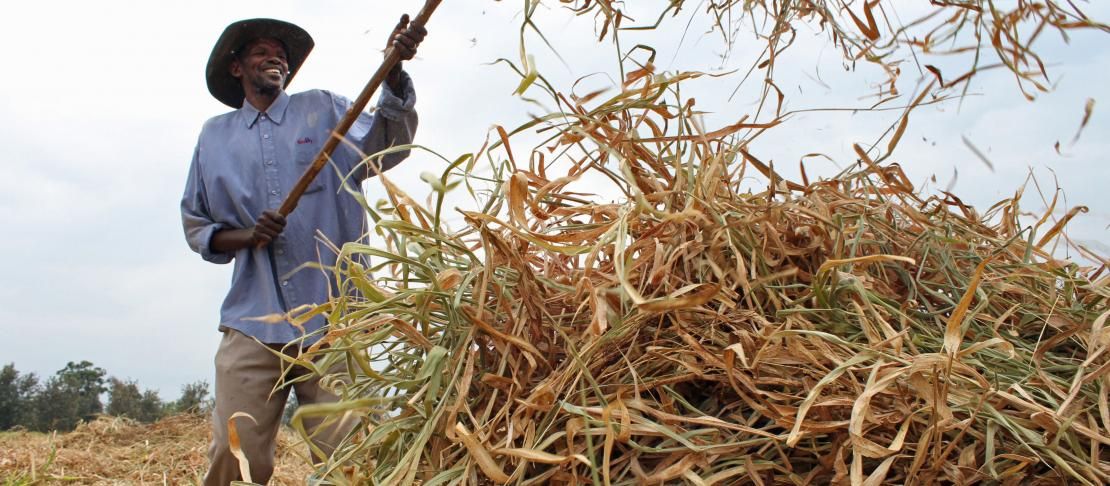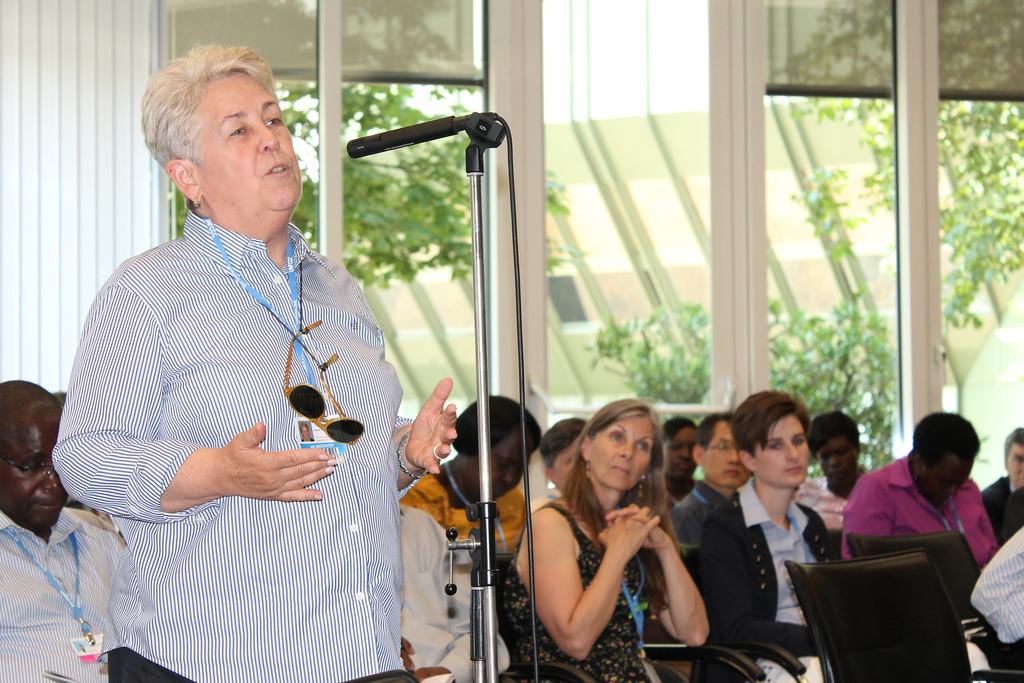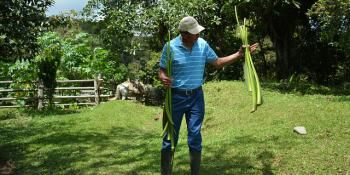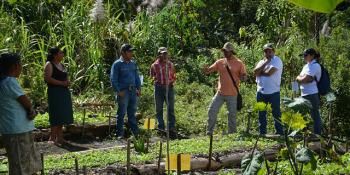Is Africa ready to take climate-smart agriculture forward?

A UNFCCC 40th Session of the Subsidiary Bodies (SB40) official side event by CCAFS and partners explored Africa’s readiness to advance Climate-Smart Agriculture.
How do African countries want agriculture to be reflected in the 2015 global climate agreement that aims to limit global warming to 2ºC?
This was a key question posed to the 64 participants attending a side event on ‘Advancing readiness to fast track climate smart agriculture in Africa’ during the ongoing United Nations Framework Convention on Climate Change (UNFCCC) 40th Session of the Subsidiary Body for Scientific and Technological Advice (SBSTA 40) meeting in Bonn, Germany.
Access the presentations from the event below:
Co-organised by the CGIAR Research Program on Climate Change, Agriculture and Food Security (CCAFS), the United Nations Food Agriculture Organization (FAO), the Southern African Confederation of Agricultural Unions (SACAU) and other partners, the meeting explored how to leverage policy, technical and financial support to scale up adoption of Climate-Smart Agriculture (CSA) in Africa. Secondly, the role of science in informing integration of CSA into national development policies and programmes was discussed.
“Achieving food security is the paramount issue for the African group”, noted Fred Kossam from Malawi who is also the African Group of Negotiators (AGN) coordinator on issues related to Agriculture. Although the sector contributes a significant amount of GHGs, responsible for around 14% of global emissions, it has a huge potential to sequester carbon and give way to emission reduction. One of key issues under consideration by the AGN is how to deal with mitigation in agriculture under SBSTA.
Watch Fred Kossam speak about the status of Agriculture in the negotiations
As negotiations on agriculture progress at slow pace, African countries continue to be adversely affected by climate change, hence the need for urgent transformation. In particular, women and other marginalized groups are the most vulnerable to the impacts of climate change. Therefore, there is increased appreciation of Climate-Smart Agriculture – that sustainably increases productivity, enhances resilience to climate change and reduces emissions intensity from improvements in production as an adaptation and mitigation option for Africa.
“Farmers need to access new breeds and shift to more adaptable production systems,” said Manyewu Mutamba, of SACAU. Additionally, they must be supported to embrace technology and move beyond the hand hoe.
Policy makers, on the other hand, need to fix capacity limitations through extension and research and also identify innovative financing frameworks such as from the private sector,”Manyewu Mutamba continued.
A number of funding opportunities for investment in CSA in Africa are available. According to Evans Njewa, the Lead Finance Negotiator for Least Developed Countries (LDCs), these are found both within and without the convention. Sources within the convention include the Least Developed Countries Fund (LDCF), the adaptation window of the Special Climate Change Fund (SCCF), Adaptation Fund and the Green Climate Fund. Sources outside the convention include the Strategic Climate Fund (SCF) by a consortium of multilateral development banks, the EU’s Global Climate Change Alliance (GCCA), the IFAD Adaptation for Smallholder Agriculture Programme (ASAP), among others.
African countries therefore need to ready themselves to access the various funding opportunities at their disposal. Such preparation will include capacity building on proposal development for the various funding pools available. “We can start getting our concepts ready for submission to the various funding agencies,” said Evans Njewa to the delegates attending the meeting.
Access to funding means adoption of CSA technologies and practices in the continent can be speeded up. According to Henry Neufeldt, head of climate change unit at the World Agroforestry Centre (ICRAF), a number of CSA readiness frameworks have been put in place to reach millions of farmers. An example is the African Climate-Smart Agriculture initiative - the 5, 6, 7 NGO Network - designed by the New Partnership for Africa’s Development (NEPAD) and partners to enable 25 million smallholder farmers to practice CSA by 2025. ICRAF is assisting in facilitating the development of the initiative.

wENDY MANN OF FAO POSES A QUESTION TO PANELISTS DURING THE SIDE EVENT. PHOTO: p. hoj (CCAFS)
An emerging CSA alliance by African countries comprises the second readiness framework. This alliance is expected to mimic and inform the global CSA framework on African issues in the agriculture sector.
Our CSA alliance will provide a platform for discussions and actions in Africa related to improved resilience in the agricultural sector, improving productivity while contributing to the global efforts to reduce emissions,”
said Richard Muyungi, former SBSTA Chair, who spoke during the session. He further added that over 25 African countries have voluntarily endorsed the CSA alliance and are willing to dialogue at the continental level.
The African CSA alliance will develop a framework within which to operate and also pilot a number of activities in the six sub regions as part of early action to address climate change. This is not to say that nothing is happening on the ground.
Read more about the African CSA alliance: Building climate resilience in the African agriculture sector
“Adaptation is already occurring in Africa autonomously mostly at the farm level,” noted Chinwe Ifejika Speranza from the University of Bonn in her speech. Such adaptation includes intergration of trees such as Faidherbia Albida into croplands, conservation agriculture, weather forecasting and early warning systems as well as index based livestock insurance that has been piloted in countries such as Kenya and Ethiopia.
In a nutshell, the side event provided an excellent opportunity for African countries to examine how far they have come in ensuring that they transform agriculture to harness opportunities for inclusive growth and sustainable development. This is especially relevant as 2014 is the year of Agriculture and Food Security that aims to consolidate active commitments toward new priorities, strategies and targets for achieving results and impacts, with special focus on sustained, all Africa agriculture-led growth, propelled by stronger, private sector investment and public-private partnerships.
View photos from the side event below:
Follow updates from SB40 on our blog and via @cgiarclimate_EA on twitter:
Climate-smart agriculture: From the meeting room to grandma's farm
Business as usual? Why landscapes matter to private sector stakeholders
Vivian Atakos is a communication specialist with CCAFS. Useful input to the blog was received from James Kinyangi, Mary Nyasimi and Catherine Mungai all of the CCAFS East Africa team.



